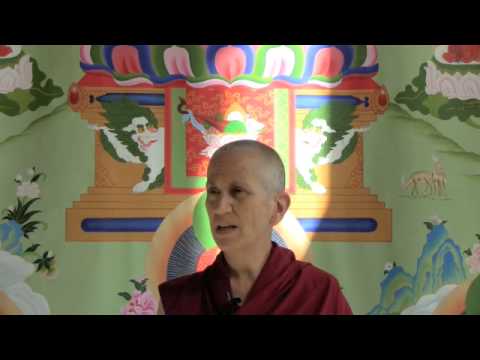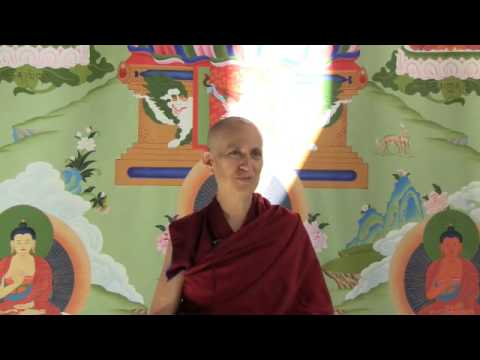The 10 non-virtues: Lying
Part of a series of Bodhisattva's Breakfast Corner talks on the Stages of the Path (or lamrim) as described in the Guru Puja text by Panchen Lama I Lobsang Chokyi Gyaltsen.
- Different kinds of lying
- Taking responsibility
We’ll speak about the four verbal actions today. And for a karma to be a complete karma it needs four parts to be complete. So the object, the attitude or motivation, the action, and the completion of the action. I went through those yesterday.
If an action is complete then it has the power to throw a future rebirth. If not all those branches are complete then it won’t necessarily ripen in a rebirth, but it could ripen in another kind of way. For example, something you experience in your life or something else like that.
Lying is deliberately saying what we know not to be the case. There are big lies where we really want to cover up something we did that we don’t want other to know about. And in that case there’s kind of a double thing. There’s the lie. But then there’s the thing we don’t want others to know about. So when we’re tempted to lie in that way, then to ask ourselves, “What did I do that I don’t want others to know about?” And then really need to do a little bit of introspection about that, because maybe we shouldn’t have been doing that to start with, so then we don’t need to lie about it.
Then there are other kinds of lies we do, what we call “little white lies.” But they’re still lies, aren’t they? Because they’re not telling the truth. And often, I think, people tell these little white lies because they think they’re going to, somehow, protect somebody else, but they usually don’t. You know if you’re home and you don’t want to talk to somebody on the phone you say, “I’m busy, I’ll call you back.” You don’t need to say, “Tell them I’m not here.” You know? It’s like, people understand you’re busy and you’ll call them back.
Then there are other lies we do to cover up for ourselves. Like we did something and we don’t really want to own up to it, and so we lie to cover it up. Or we don’t want to get caught in doing some small thing, so we lie. Or we think somebody’s going to disapprove of what we’re going to do, or they’re going to speak harshly to us over some small thing, so we kind of cover it up and lie, and this and that. And that can become quite a pattern in our lives. And so again, to stop and ask ourselves, “Well why am I doing this?”
Because it already involves a presupposition that the other person is going to judge me. You know? There’s some small thing and I can’t say things honestly because I’m sure that, even though it’s a small thing, somebody’s going to disapprove, somebody’s going to judge me, somebody’s going to criticize me … But that’s pretending like we’re a mind-reader. Isn’t it? And it’s not really trusting the other person very much, that they’re going to respond in an understanding way. And it’s also not really being honest about what we’re doing and taking responsibility.
So I think it’s good, just say things and people understand. And if they don’t, then you talk about it and explain it and then they understand. But I think what’s so detrimental—Well, there are many detrimental things about lying, but especially what it does is it destroys trust. Because I don’t know about you <… If somebody tells you a big lie—and you usually find out about it later on—and then do you trust that person afterwards? [shakes head] Forget it.
And so to think, in our relationships, if we do things that we don’t want others to know about, and then we lie about it, then just ask Bill Clinton what happens. You know? [Laughter] It’s not good, is it? Much better just to monitor our actions, be truthful about what we do, and move on.
Okay, that’s enough for today.
Venerable Thubten Chodron
Venerable Chodron emphasizes the practical application of Buddha’s teachings in our daily lives and is especially skilled at explaining them in ways easily understood and practiced by Westerners. She is well known for her warm, humorous, and lucid teachings. She was ordained as a Buddhist nun in 1977 by Kyabje Ling Rinpoche in Dharamsala, India, and in 1986 she received bhikshuni (full) ordination in Taiwan. Read her full bio.


